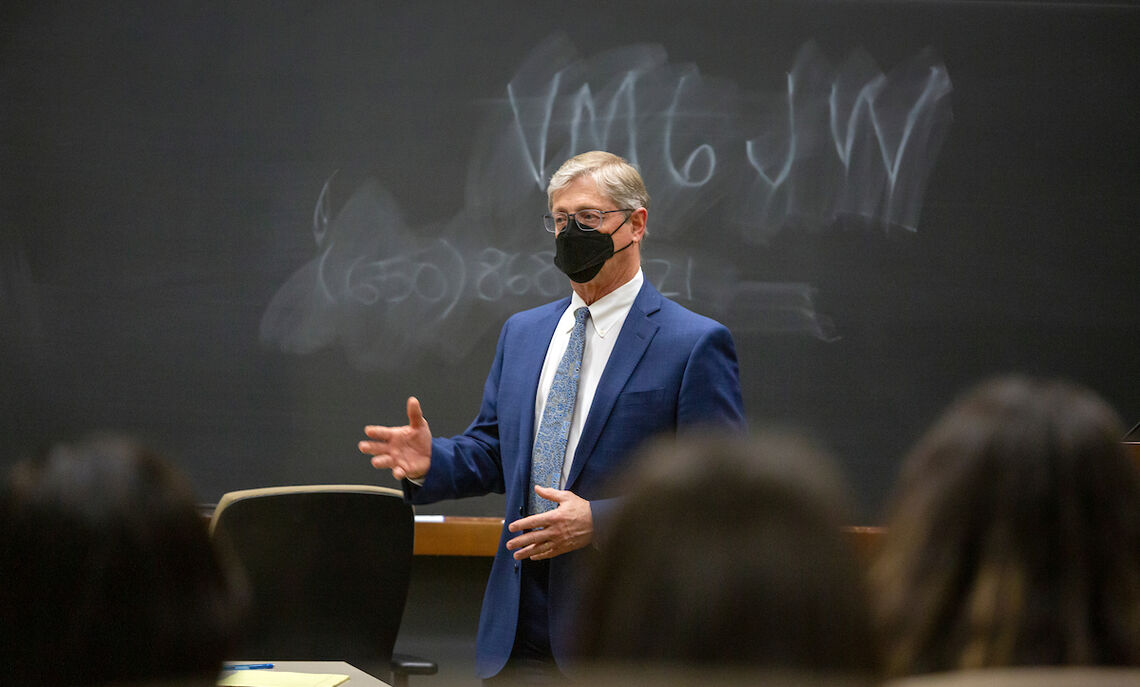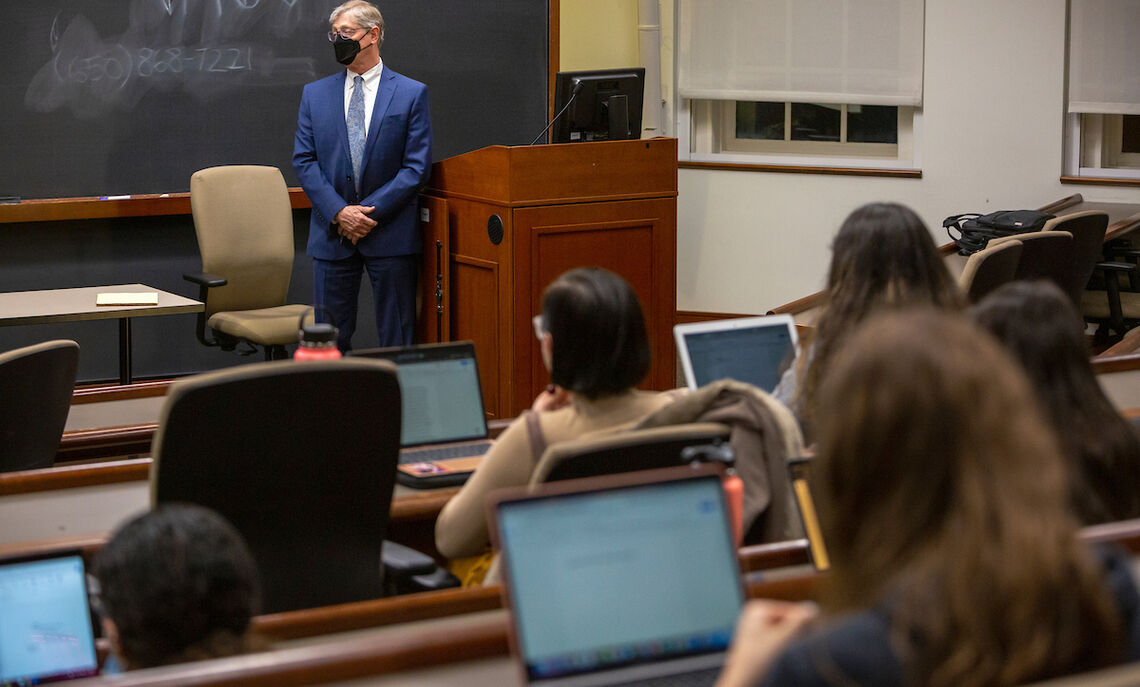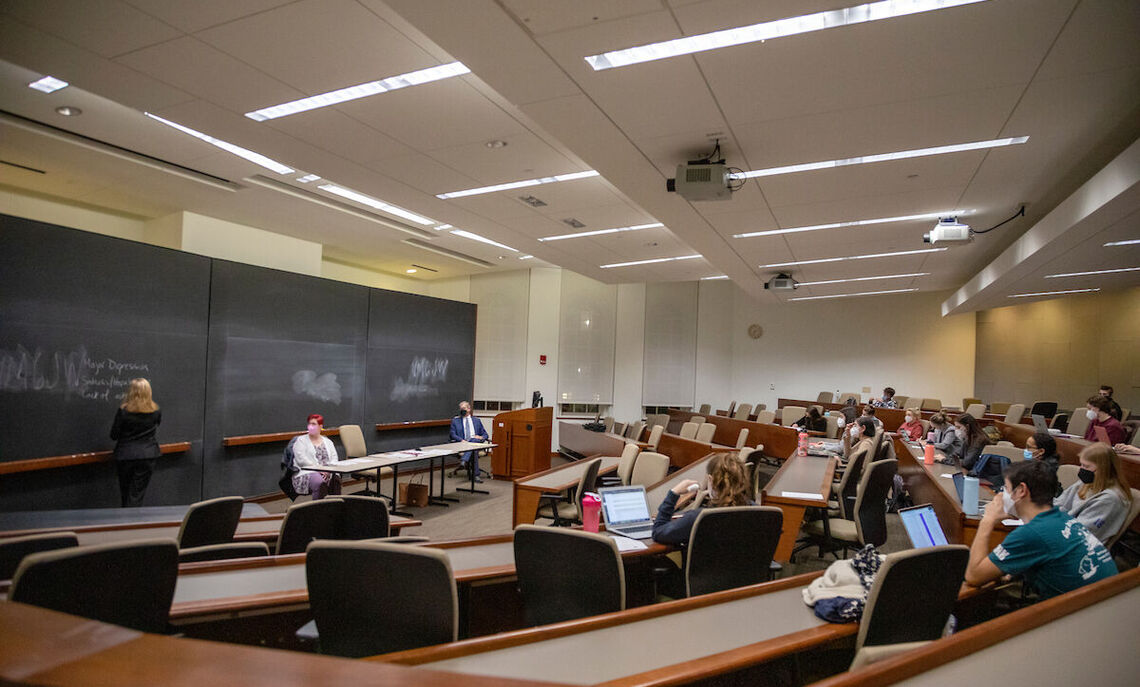F&M Stories
Community-Based Learning Teaches in Real Time
On a recent winter evening, students gather in a Franklin & Marshall lecture hall as Senior Adjunct Assistant Professor of Public Health David Ashworth announces a few pending judiciary field trips.
"I've also been told by the warden that we're a 'go' to visit the prison," says Ashworth, who serves as Lancaster County's President Judge.
As students open notebooks and settle in, he asks whether anyone attended a magisterial district court session, where minor criminal and civil cases are heard. A few hands go up.
"What are your observations?" the judge asks.
Students in this public health course report a variety of cases, including a man facing parole violations and a suspect arraigned on charges of child molestation. Attending all levels of county courts is a course requirement, as is keeping a journal through the semester.
In his courthouse office, Ashworth says, "I tell the students in the very first class that if I'm not able to get them out of their comfort zone sometime during the semester, then I've failed."
More than a decade ago, Ashworth arrived at F&M at the request of a faculty member to develop a community-based learning course on "drug courts," which, as a problem-solving court, focus less on the punitive and more on the recovery and understanding of addictive behaviors.
In 2005, his predecessor as county president judge asked him to organize a drug court, which, since the late 1980s, proved effective in lowering recidivism rates in other states such as Florida, where the first one started.
"Over the years, I've learned a tremendous amount about recovery and addiction – it's now called substance-use disorder – and realized that people who are not involved in this field really don't have a working knowledge or an understanding of what recovery is all about," he says.
Ashworth shared his efforts with Professor of Government Susan Dicklitch-Nelson – they trained at the same karate school – and she encouraged him to teach. He agreed to community-based learning that relies more on experiencing the justice system like drug court.
"One of the best ways to get the word out there is teach the people who are going to be running the world someday, and those are F&M students," he says. "It's really focused on the experiential learning as opposed to lecturing to them and having them regurgitate back onto an exam."
For senior government major Liz Geogelis, the class informed her studies in critical ways.
"One of the main highlights for me has been gaining a new perspective on not only the inner workings of the problem-solving court systems in Lancaster County, but also on the lives of the people in the community who have been impacted by the way these courts operate," she says.
Alumni Akbar Hossain, '13, a University of Pennsylvania law school graduate and F&M trustee, calls the judge "a wonderful mentor" whose teachings about problem-solving courts and the scenes behind the criminal justice system influenced his decision to pursue law.
"Judge Ashworth brought that reality to campus and showed us the good that lawyers can do through creativity and advocacy," he says. "We also learned about the intersection of law and public policy, which everyone thinks about, but it's hard to pinpoint."
Ashworth says he focuses the class on the real world and lists among the field trips a visit to the morgue, where the coroner explains his role and the impact of drugs and overdoses.
"There's nothing like the real-world smell of a morgue that you never forget," he says.
Related Articles
January 28, 2026
Virtual Cadaver Lab to Redefine & Accelerate Health Professions Training at F&M
Franklin & Marshall College is set to transform its pre-health and science curriculum thanks to a generous grant from the George I. Alden Trust. The funding will support the development of a state-of-the-art virtual cadaver lab, bringing high-tech, immersive anatomical study to F&M’s campus.
November 17, 2025
F&M Nationally Recognized for Wellness Education & Violence Prevention
F&M’s Office of Wellness Education and Violence Prevention has gained national recognition for a bystander intervention marketing campaign. Meet the dedicated group of F&M peer health educators who provide health and wellness advocacy on campus.
November 13, 2025
Trailblazing Research Examines Cigarette Label Alternatives
Three F&M students helped conduct a groundbreaking pilot study in Lancaster this summer, assisting Professor Hollie Tripp with tobacco regulatory research. It's the first F&M instance of biospecimen collection from non-campus participants.



